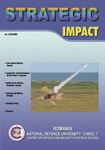ECONOMIC SANCTIONS - MEANS OF DISCOURAGING THE USE OF FORCE
ECONOMIC SANCTIONS - MEANS OF DISCOURAGING THE USE OF FORCE
Author(s): Petre-Ciprian ConstantinescuSubject(s): Economic policy, International relations/trade, Security and defense, Geopolitics, Peace and Conflict Studies
Published by: Carol I National Defence University Publishing House
Keywords: Economic Sanctions; Discouraging the use of force;
Summary/Abstract: Economic sanctions underline the justification and necessity to observe thm in the context of précising the proximal genre of the definition, i.e. an economic sanction is any restriction imposed in the international trade, by a country (originator) to another one (target), in order to persuade the government of the target country to change its politics. The sanction must be considered as an episode that can be placed in time, with a beginning, a content and an end, corresponding to the decision-making, the management and the lift. If it is rather easy to make a decision and impose a sanction, more it is more difficult to choose the moment and the conditions, whose evolution might, many times, become dangerous. The justification of the sanction, i.e. to announce the targeted objectives and the determinant reasons, is a key-moment that should not be “missed” by the ones that lead: the support of the population, as a wider consequence, depends on it. The exercise is even more delicate when the sanctions imply food supplies. During the Gulf crisis, the Iraqi government attempted to use this dilemma, which led to a large number of newborns and children ending dead because of the lack of milk, determining the Coalition to adopt the principle of “humanitarian” aid (the Resolution 666 of the Security Council). Internationally, co-operation is difficult to acquire and maintain. If it is not reached from the very beginning, or at least partially, it is easy to predict that the external support will go to wreck quickly, and the co-operant countries will end selling the due markets before those ones that are not part of the embargo. Besides voluntary adhesion, in order to ensure the efficiency and the observance of sanctions, a control mechanism must be established to benefit from the legal means to punish the offenders, such as the Sanctions Committee during the Gulf crisis.
Journal: Strategic Impact
- Issue Year: 2007
- Issue No: 23
- Page Range: 33-40
- Page Count: 8
- Language: English

